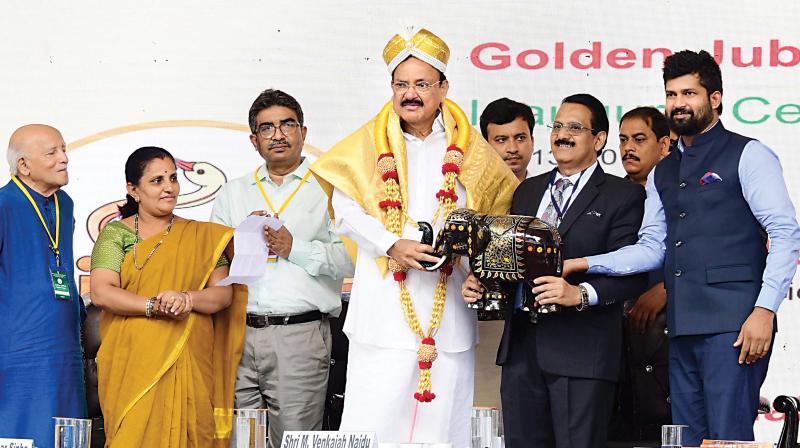Education policy must help bring prosperity to all: Vice-President M Venkaiah Naidu

Mysuru: Vice-President of India Mr M. Venkaiah Naidu said that he has been advocating the need for revamping the education system, including the school education content and he hoped that the draft national policy on education, which is being debated, will pave the way for a resurgent educational system that contributes for the prosperity and well-being of all our people.
Speaking after laying the foundation stone for Dr S Radhakrishnan auditorium at the campus of Regional Institute of Education of National Council of Educational Research and Training in Mysuru on Saturday, he said, "the Indian education system is passing through a critical phase today as we strive towards quality and equity for all in the era of globalization. We have made huge progress in school, teacher and higher education. The enrolment rates have increased significantly, the infrastructure facilities have improved tremendously and now it is time for us to focus on educational transaction that happens within the classroom."
" Expectations are immense from the teaching community to not only maintain high standards of teaching but also impart right values and mould students into responsible and socially-conscious citizens. Education should not be mechanical, and its goal should not be merely to get employment, it should lead to enlightenment and empowerment of the student by fostering humane qualities and prepare them to face various challenges in life by providing them with the requisite life-skills."
Naidu emphasized that protecting and conserving the nation's unique and rich linguistic heritage is patriotism. Speaking after inaugurating golden juibilee celebrations of Central Institute of Indian Languages, in Mysuru on Saturday, he also said "More than 19,500 languages or dialects are spoken in India as mother tongues, according to the Language Census. There are 121 languages which are spoken by 10,000 or more people in India. Languages are never static, but dynamic living social phenomena. They grow, shrink, transform, merge, and sadly, die. It is extremely disheartening to learn that 196 languages of our country are classified as endangered. We may have to ensure that this number doesn’t increase. We have to protect and preserve our languages and the best and only way is to constantly use them," he said. He said, "we must start making the mother tongue the medium of instruction in our schools at least at the primary level. We must also not fail to teach our children multiple languages in order to wi
den the horizon of their understanding of both literature and science." Pushing for the implementation of the three-language formula in letter and spirit throughout the country he said "we must explore the possibility of permitting our Parliamentarians to speak in their mother tongues in the House.
“The Supreme Court of India has recently decided to make available its judgements in six vernacular languages, to start with. This is a positive step in the direction of removing language barriers and ensuring equal access to justice. The Finance Ministry has decided to conduct examinations for employment in Regional Rural Banks in 13 regional languages in addition to English and Hindi. All these initiatives will help in creating a level playing field. Many more bold decisions must be made to protect and nurture our languages. In a democracy, especially in a knowledge economy like India, we must not foster the tendency to discriminate between people based upon their ability or inability to speak a particular language."

